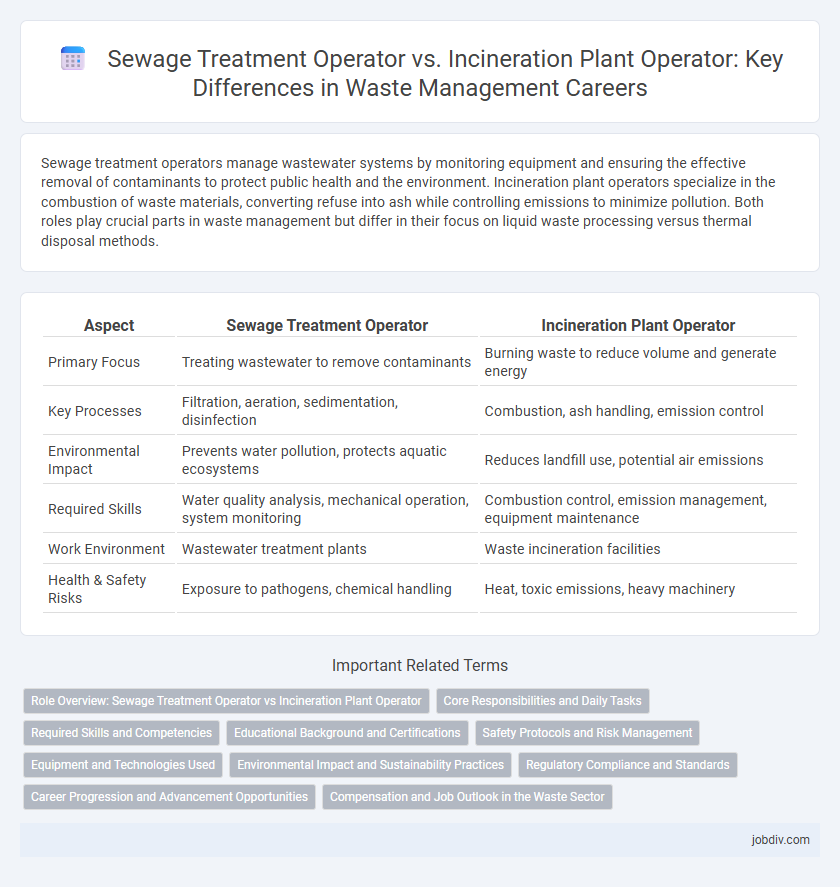Sewage treatment operators manage wastewater systems by monitoring equipment and ensuring the effective removal of contaminants to protect public health and the environment. Incineration plant operators specialize in the combustion of waste materials, converting refuse into ash while controlling emissions to minimize pollution. Both roles play crucial parts in waste management but differ in their focus on liquid waste processing versus thermal disposal methods.
Table of Comparison
| Aspect | Sewage Treatment Operator | Incineration Plant Operator |
|---|---|---|
| Primary Focus | Treating wastewater to remove contaminants | Burning waste to reduce volume and generate energy |
| Key Processes | Filtration, aeration, sedimentation, disinfection | Combustion, ash handling, emission control |
| Environmental Impact | Prevents water pollution, protects aquatic ecosystems | Reduces landfill use, potential air emissions |
| Required Skills | Water quality analysis, mechanical operation, system monitoring | Combustion control, emission management, equipment maintenance |
| Work Environment | Wastewater treatment plants | Waste incineration facilities |
| Health & Safety Risks | Exposure to pathogens, chemical handling | Heat, toxic emissions, heavy machinery |
Role Overview: Sewage Treatment Operator vs Incineration Plant Operator
Sewage Treatment Operators manage the processing of wastewater by monitoring equipment, controlling chemical dosing, and ensuring compliance with environmental regulations to prevent pollution. Incineration Plant Operators oversee the combustion of waste materials, maintaining furnace operations, controlling emissions, and managing ash disposal to reduce landfill use. Both roles require technical expertise and adherence to safety protocols but differ in the treatment processes and waste types handled.
Core Responsibilities and Daily Tasks
Sewage Treatment Operators manage wastewater systems by monitoring equipment, testing water samples for contaminants, and ensuring compliance with environmental regulations to prevent pollution. Incineration Plant Operators oversee waste combustion processes, control emissions by regulating furnace temperatures, and maintain machinery to convert solid waste into ash, gas, and heat. Both roles require meticulous record-keeping and adherence to safety protocols but differ in waste type focus and treatment technology.
Required Skills and Competencies
Sewage Treatment Operators require expertise in monitoring water quality, operating filtration and biological treatment systems, and understanding biochemical processes to ensure environmental compliance. Incineration Plant Operators must have strong skills in managing combustion equipment, controlling emissions through advanced pollution control technologies, and adhering to strict safety protocols to minimize hazardous waste impacts. Both roles demand technical proficiency, problem-solving abilities, and knowledge of regulatory standards specific to waste management.
Educational Background and Certifications
Sewage Treatment Operators typically require a high school diploma or equivalent, with many pursuing certifications such as the Grade I or II Wastewater Treatment Plant Operator licenses to ensure compliance with environmental regulations. Incineration Plant Operators often need similar educational backgrounds but benefit from specialized training in hazardous waste management and air pollution control certifications like the Certified Hazardous Materials Manager (CHMM). Both roles demand a strong understanding of safety protocols and environmental laws to operate complex waste treatment systems efficiently.
Safety Protocols and Risk Management
Sewage Treatment Operators implement stringent safety protocols to manage biohazard exposure, ensuring protective gear use and regular monitoring of wastewater contaminants to prevent health risks. Incineration Plant Operators focus on controlling toxic emissions and fire hazards through continuous equipment inspections and adherence to combustion safety standards. Both roles demand rigorous risk management strategies to safeguard workers and the environment from operational hazards.
Equipment and Technologies Used
Sewage Treatment Operators utilize advanced filtration systems, aeration tanks, and biological reactors to manage wastewater purification processes effectively. Incineration Plant Operators rely on high-temperature furnaces, flue gas treatment systems, and ash handling equipment to safely combust waste and reduce volume. Both roles require expertise in monitoring complex machinery and ensuring compliance with environmental regulations through state-of-the-art control technologies.
Environmental Impact and Sustainability Practices
Sewage Treatment Operators play a critical role in reducing water pollution by managing biological and chemical processes that treat wastewater, thereby protecting aquatic ecosystems and promoting water reuse. Incineration Plant Operators focus on waste volume reduction and energy recovery by burning solid waste, but face challenges related to air emissions and residual ash disposal. Sustainable practices for sewage operators include implementing advanced nutrient removal and sludge recycling, while incineration operators prioritize emission control technologies and ash residue minimization to mitigate environmental impact.
Regulatory Compliance and Standards
Sewage treatment operators must adhere to strict Environmental Protection Agency (EPA) regulations and local wastewater discharge permits to ensure treated water meets safety standards before release. Incineration plant operators are governed by air quality regulations such as the Clean Air Act, requiring continuous emission monitoring systems (CEMS) to control pollutants like dioxins and particulate matter. Both operators ensure compliance through extensive record-keeping, regular audits, and adherence to Occupational Safety and Health Administration (OSHA) guidelines to maintain environmental and workplace safety.
Career Progression and Advancement Opportunities
Sewage Treatment Operators advance by gaining expertise in wastewater management, leading to supervisory roles or specialized positions in environmental compliance and system maintenance. Incineration Plant Operators progress through mastering combustion technology and emissions control, often moving into roles involving regulatory compliance, plant management, or technical consulting. Both careers offer pathways into environmental engineering and public health sectors, with advancement tied to certifications, technical skills, and experience in hazardous waste handling.
Compensation and Job Outlook in the Waste Sector
Sewage treatment operators earn an average annual salary ranging from $45,000 to $60,000, reflecting steady demand due to essential public health functions and ongoing infrastructure investments. Incineration plant operators typically receive higher compensation, averaging between $55,000 and $70,000, driven by the specialized skills required to manage hazardous waste combustion and emissions control. Job outlook for both roles remains stable with moderate growth projected, as expanding environmental regulations and waste management needs increase reliance on qualified operators in the waste sector.
Sewage Treatment Operator vs Incineration Plant Operator Infographic

 jobdiv.com
jobdiv.com